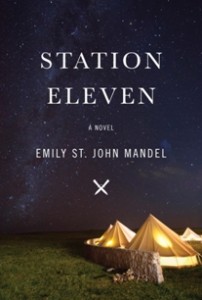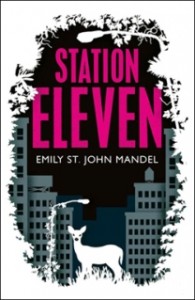Here’s a thing I cannot abide with in stories about the apocalypse: People frantically shopping for groceries. I don’t know why. I am an excellent pre-disaster grocery shopper myself. When I lived in New York, I had to stop myself from charging about the store removing imprudent disaster groceries from other people’s baskets. (Attention New Yorkers: Get flashlights, not candles. Stop buying up all the milk.) I am fine with this. But when I read about it in books, my throat closes up. This was the scariest detail to me in Life As We Knew It, and it almost made me stop reading Station Eleven.
I’m glad I persisted. Station Eleven (affiliate links: Amazon, B&N, Book Depository) hits some of the beats you would expect for a post-apocalyptic novel, from the story of the days when everyone realized nothing was going back to normal, to the requisite doomsday cult preaching about the survivors being the blessed ones. But in the space between those things is an elegy for the impermanence of the life we know.
Kirsten Raymonde was a child actor just before the world ended, just before a deadly strain of flu claimed the lives of 99% of the human population. Now, twenty years after, she’s a member of the Traveling Symphony, which goes from settlement to settlement performing music and plays by Shakespeare to the people who survived. Station Eleven moves back and forth in time, from the present day to the time before the plague, to one year after it, five years after, fifteen years after.
Station Eleven is a complicated puzzle box of a book. Mandel reveals information in the way that I love best, where it is less like uncovering secrets and more like pointing up connections that, once spotted, feel inevitable. With all the moving parts rattling around in this book, I expect it will repay rereading, with more small details to be noticed and admired. Station Eleven is on the short list for the National Book Award, and book awards are not always the way to my heart because they tend to reward beautiful sentences rather than skillful plotting. But if I established my own book award to honor books that were skillfully plotted (because — controversial opinion but I think I am right — skillful plotting is a rarer and trickier skill than beautiful sentence-writing, and it is bewildering to me how despised it is amongst the populace), I think Station Eleven would still have a place on the short list. There are many cogs in this machine, and they click together beautifully.
(Nuh-uh, you mixed your metaphors.)
Tonally, Mandel’s triumph is to force you to unrecognize the familiar things in your life; or rather, to remind you that everything that feels permanent is fundamentally losable.
“It just doesn’t make sense,” Elizabeth insisted. “Are we supposed to believe that civilization has just come to an end?”
“Well,” Clark offered, “it was always a little fragile, wouldn’t you say?”
Mandel forces you to feel — not pampered for having had all the good fortune and luxury of life in the developed world in the twenty-first century — but lucky to have all those things. She unfamiliarizes them for the reader and then shows them to us anew. Because all the people in her book, who are us, all the ones who remember the olden days, miss things that we may not ever think to miss on our own, things like the sound of an electric guitar or the haunted sight of a lit-up pool at midnight.
Plus, I just love the writing. Some bits:
There was a time when this conversation would have reduced her to tears, but now she swivels in her chair to look out at the lake and thinks about moving trucks. She could call in sick to work, pack up her things, and be gone in a few hours. It is sometimes necessary to break everything.
If hell is other people, what is a world with almost no people in it? Perhaps soon humanity would simply flicker out, but Kirsten found this thought more peaceful than sad. So many species had appeared and later vanished from this earth; what was one more? How many people were even left now?
If there are symphonies and newspapers, then what else might this awakening world contain? Perhaps vessels are setting out even now, traveling toward or away from him, steered by sailors armed with maps and knowledge of the stars, driven by need or perhaps simply by curiosity: whatever became of the countries on the other side? If nothing else, it’s pleasant to consider the possibility. He likes the thought of ships moving over the water, toward another world just out of sight.
I really talked myself into Station Eleven as I was writing this post. I was originally going to have a paragraph about not connecting emotionally to the characters, which is still sort of true? But I discovered that it makes no difference to my enjoyment of the book in this case, because I had such a strong emotional connection to the world of it. Highly, highly recommended.
Cover report: I think American? What do you think? I am willing to be dissuaded. I just feel like the British cover doesn’t look like anything, and the American cover looks like it could be a traveling theater troupe or the end of the world.

